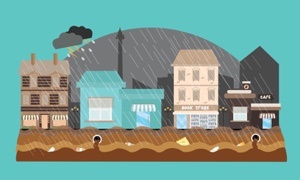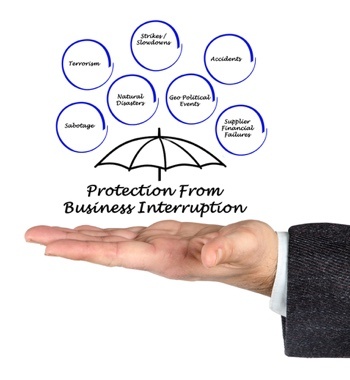 If your company has never been struck by catastrophe, consider yourself lucky! But that doesn’t mean that your luck will hold out forever. There’s always a flood, hurricane, explosion, earthquake, lightning, or terror attack waiting around the bend.
If your company has never been struck by catastrophe, consider yourself lucky! But that doesn’t mean that your luck will hold out forever. There’s always a flood, hurricane, explosion, earthquake, lightning, or terror attack waiting around the bend.
And you and your entire company must be ready for it. With wildfires destroying over ten-million acres last year and winter storms causing $3.5 billion in insured losses earlier this year, businesses cannot afford to assume that they will be exempt from a catastrophe that strikes without warning. Getting the right business insurance is an important first step, but there are many practical things you can do to be prepared and to lower the cost and impact of a disaster.
Consider the following as you prepare your organization for a disaster:
1. Prepare safety equipment, including:
- Fire extinguishers
- Fire-fighting equipment
- Personal protective equipment that includes steel-toe and slip-resistant footwear, hardhats, eye protection, high visibility clothing, gloves, hearing protection, dust masks or respiratory protection
- First-aid kits
- Wireless communication equipment
2. Engineering controls
Escape paths, lockout tag-out controls, shut-off valves, guardrails, and exhaust ventilation that will minimize exposure to airborne hazards must be planned and inspected. Battery-powered emergency lighting, strategically placed, must be set up to go on immediately after you lose power.
3. Maintain emergency equipment
- Check and test the emergency generator
- Check fuel levels regularly on generators and fire pumps
- Check all roof-mounted equipment to ensure that it’s securely connected
- Check roof drains to make sure they are clear and able to handle heavy rains
- Check the roof and make any repairs, no matter how minor
4. Provide training
Establish an emergency response team with participants from all parts of your organization. Then, conduct disaster management drills to ensure all members of the emergency response team and all other employees know their responsibilities. Conduct daily safety briefings that discuss hazards and controls. Identify and eliminate or control existing or potential dangers that you discover after any disaster. Job performance appraisals should be tied in with compliance on all employee training.
5. Secure your data
- Copy your valuable papers and records, and put them in a safe place.
- Make sure that back-ups of computer records are current and kept in a safe location off-site.
- Confirm that any of your third-party vendors or cloud providers are also prepared for any natural or man-made disasters.
6. Work with your local government before a catastrophe hits
File a copy of your emergency response plan with local law enforcement officials, and provide them with new versions as you update them. Make sure that the local government’s emergency response team has contact information for your company. Give them updates whenever anyone on your team leaves the company or changes roles.
7. Patrol your facility during the emergency
As long as it’s safe to be there, your emergency response team should be patrolling the facility. The team should be concentrating on the following:
- Make sure all equipment is functioning properly.
- Repair any structural damage, if possible
- Correct any potential fire hazards
- Monitor the water pressure for your sprinkler heads.
- Deploy sandbags if flooding seems imminent.
8. Emphasize workplace safety after the disaster
Once your business has resumed normal operations, it’s important to reinforce standard safety measures:
- Ensure that your employees are using proper lifting techniques, and provide material handling equipment to keep manual lifting to a minimum.
- Limit the amount of employee exposure to hazardous conditions.
- Minimize exposure to dangerous situations by rotating employees.
- Make personal hygiene and sanitation your company’s priority, and give workers an area where they can clean up after each shift.
Get the Right Insurance Protection for Your Business - Contact Us to Learn More
 To learn more about preparing and protecting your business with the right types and amounts of commercial insurance, contact American Insuring Group online or call us at (800) 947-1270 or (610) 775-3848.
To learn more about preparing and protecting your business with the right types and amounts of commercial insurance, contact American Insuring Group online or call us at (800) 947-1270 or (610) 775-3848.



 A recent national survey of small businesses yielded some sobering statistics. It found that 66 percent of these businesses do not have business interruption insurance—even though an estimated 25 percent of them will not be able to reopen following a major loss, such as a fire, a break-in, or a storm.
A recent national survey of small businesses yielded some sobering statistics. It found that 66 percent of these businesses do not have business interruption insurance—even though an estimated 25 percent of them will not be able to reopen following a major loss, such as a fire, a break-in, or a storm.



